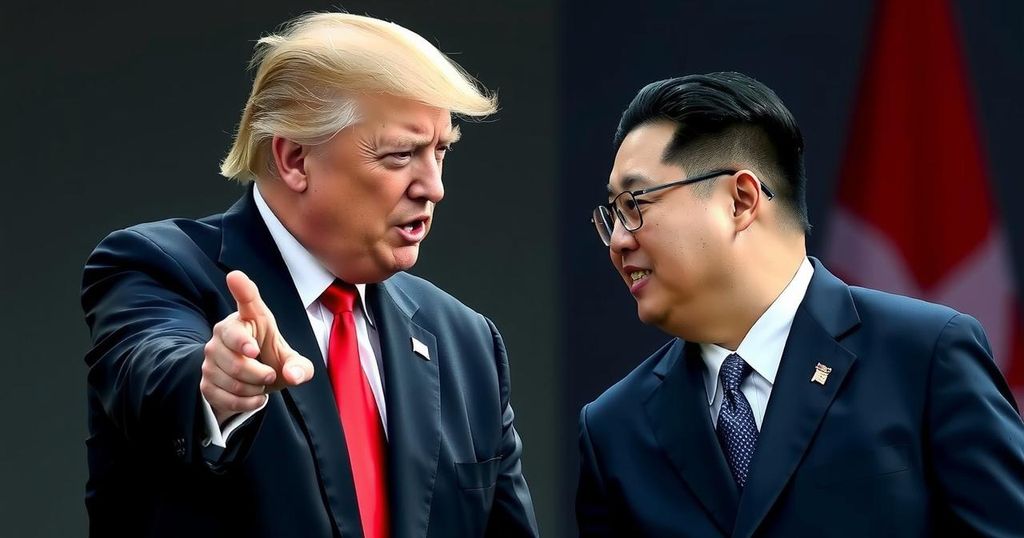Global news
ASIA, BENNET, BIDEN ADMINISTRATION, BRUCE BENNET, BUSINESS INSIDER, CHINA, DONALD TRUMP, ENERGY INFRASTRUCTURE, EURASIA GROUP, EUROPE, EUROPE/ASIA, FOREIGN POLICY, GEOPOLITICS, HANOI, INTERNATIONAL RELATIONS, JEREMY CHAN, KIM, KIM JONG - UN, KIM JONG UN, KOREA, NORTH, MEXICO, MILITARY DRILLS, NORTH AMERICA, NORTH KOREA, PYONGYANG, RAND CORPORATION, REUTERS, RUSSIA, TRUMP, UKRAINE, UN, US, VIETNAM
Marcus Li
0 Comments
Navigating New Challenges: Trump, Kim Jong Un, and North Korea’s Evolving Role
Donald Trump faces a more assertive Kim Jong Un upon his potential return to the presidency, as North Korea has strengthened its position with support from Russia amidst ongoing global conflicts. Analysts highlight a deterioration in U.S.-North Korea relations since their last significant meeting, suggesting that previous methods of diplomacy may require re-evaluation in light of current geopolitical dynamics.
As Donald Trump prepares to reclaim the presidency, he faces a significantly altered dynamic with North Korean leader Kim Jong Un, who has emerged more emboldened amidst international events. Trump’s past claims of a productive relationship with Kim stand in stark contrast to Kim’s recent accusations of U.S. aggression, highlighting a deteriorated rapport following their ill-fated Hanoi meeting in 2019, which left Kim with a lingering resentment. North Korea’s current status as a strategic ally to Russia complicates matters further, as Kim has taken advantage of global shifts, such as the Ukraine conflict, to strengthen his position and defy international sanctions.
Despite Trump’s inclination for direct diplomacy, analysts suggest he may come to the negotiation table with a weaker hand due to North Korea’s bolstered military capabilities and the ongoing support it receives from Russia. A renewed initiative by Trump could entail proposing a halt to nuclear developments rather than outright denuclearization, which Kim may perceive as a chance to elevate North Korea’s status on the global stage. Nevertheless, skepticism remains about whether Kim is willing to engage after past grievances, indicating that traditional methods of pressure might resurface alongside diplomatic overtures.
The evolving relationship between the United States and North Korea, particularly under the leadership of Donald Trump and Kim Jong Un, is marked by past diplomatic endeavors that have not yielded the intended results. Trump’s initial approach during his presidency sought to apply maximum pressure through sanctions and direct engagement with Kim; however, the outcome was fraught with challenges, leading to a breakdown in trust. As geopolitical landscapes shift, including Russia’s involvement in Ukraine, the strategic calculus for both leaders has transformed, necessitating a re-evaluation of previous diplomatic strategies.
In conclusion, as Donald Trump aims to re-establish his connection with Kim Jong Un, he must navigate a significantly more assertive North Korea, armed with resources and support that have ameliorated its international isolation. While Trump’s ability to engage in fruitful talks remains in question, the dynamics of global politics, including relations with Russia, will greatly influence the potential for a diplomatic breakthrough. Addressing Kim’s aspirations while balancing the ongoing challenges presented by North Korea’s military developments will be crucial in shaping U.S. foreign policy in the region moving forward.
Original Source: www.businessinsider.com




Post Comment